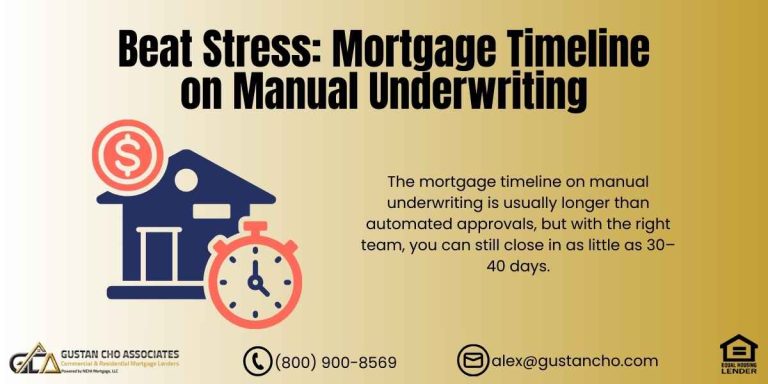Buying a home is exciting, but it also comes with new responsibilities. Property taxes, homeowners’ insurance, and mortgage payments can feel overwhelming if you juggle them alone. That’s why most lenders rely on escrow account mortgage guidelines to keep everything running smoothly.
Think of an escrow account as your personal safety net. A part of your mortgage payment is allocated to this account to cover taxes and insurance every month. This helps you avoid the stress of missing payments or facing surprise bills. Whether buying your first home, refinancing, or looking into FHA, VA, or conventional loans, understanding escrow account rules can save you time and money and make your life easier.
In this guide, we’ll explain everything you need to know—from how escrow works to the rules for different loan programs, the pros and cons, common pitfalls, and what to do if something goes wrong.
What Are Escrow Account Mortgage Guidelines?
When you buy a home, your lender may require you to set up an escrow account. Under escrow account mortgage guidelines, this account collects part of your monthly property taxes and homeowners’ insurance.
Think of it like a dedicated checking account. You pay 1/12 of your annual taxes, insurance premiums, and mortgage payments each month. The lender uses those funds to pay your bills when due.
Key Point: Escrow account mortgage guidelines exist to protect both you and the lender by making sure critical bills are always paid on time.
Understand Escrow Accounts for Your Mortgage
Learn how escrow accounts work and why they’re required for your home mortgage.
Why Lenders Enforce Escrow Account Mortgage Guidelines
Lenders want to protect their investment. The property could face a tax lien or risk being uninsured if taxes or insurance aren’t paid. That’s why mortgage servicers follow strict escrow account mortgage guidelines:
Taxes Paid on Time
Ensuring property taxes are paid promptly is crucial for maintaining ownership rights. Lenders mandate this to prevent the possibility of tax liens, which could jeopardize their investment and put the homeowner’s property at risk.
Insurance Always Active
Keeping insurance active safeguards the property against potential damage or loss. By enforcing this requirement, lenders protect their financial interests even in unforeseen circumstances, such as natural disasters or accidents.
Borrower Convenience
An escrow account simplifies the payment process for borrowers by consolidating their monthly mortgage and escrow contributions. This arrangement allows homeowners to budget more effectively and avoid the stress of managing separate payments for taxes and insurance.
Lender Security
By maintaining escrow accounts, lenders minimize their risk of foreclosure or loss of collateral. This practice not only protects their investment but also creates a more stable lending environment, benefiting both borrowers and lenders.
In short, escrow account mortgage guidelines keep everything current and simple.
FHA, VA, and Conventional Escrow Account Mortgage Guidelines
Different loan programs have different escrow requirements. Here’s how escrow account mortgage guidelines apply:
FHA Loans
FHA loans require the establishment of escrow accounts for the duration of the loan, and borrowers are not permitted to waive this requirement. These escrow accounts are designed to cover essential expenses, including property taxes, insurance, and FHA mortgage insurance, ensuring that these costs are managed effectively over the life of the loan.
VA Loans
VA loans require the establishment of escrow accounts as per their mortgage guidelines. These accounts are designed to cover property taxes and insurance, providing borrowers the benefit of not paying monthly mortgage insurance.
Conventional Loans
Conventional loans require escrow for borrowers whose loan-to-value (LTV) ratio exceeds 80%. However, those who can put down more than 20% and have strong credit may have the option to waive escrow. It’s important to note that choosing to forgo escrow could lead to higher rates or fees.
Tip: If you have less than 20% equity in your home, your mortgage will be subject to escrow account guidelines, no matter who the lender is.
What Is an Escrow Account and How Does It Affect Your Mortgage?
We’ll break down how escrow accounts handle your taxes and insurance payments.
How Escrow Analysis Works Under Escrow Account Mortgage Guidelines
Every year, lenders run an escrow analysis to ensure compliance with escrow account mortgage guidelines. The review checks:
1. Expected Expenses
Lenders conduct an escrow analysis to project expected expenses such as property taxes and homeowner’s insurance premiums. By estimating these costs, they help ensure that borrowers have sufficient funds in their escrow accounts to cover these essential payments throughout the year. This projection is vital for maintaining a current and accurate financial plan for the borrower’s mortgage.
2. Escrow Cushion
Under the Real Estate Settlement Procedures Act (RESPA), lenders are permitted to maintain an escrow cushion, which allows them to hold up to two months’ worth of extra payments. This cushion safeguards against unexpected increases in property tax or insurance costs, ensuring that the borrower’s account remains funded. The cushion helps prevent shortfalls that could lead to missed payments or penalties.
3. Shortages or Surpluses
During the analysis, lenders also identify any shortages or surpluses in the escrow account. If property taxes increase, the monthly escrow payment will likely rise to accommodate the higher bills, ensuring enough funds are available. Conversely, if taxes decrease, borrowers may receive a refund or a reduction in their monthly payment, creating potential savings for their household budget.
For instance, if a homeowner’s property taxes increase by $600 annually, the escrow account guidelines stipulate that the monthly escrow payment should increase by $50. This adjustment helps maintain adequate funding in the account to cover the new tax obligations. Keeping accurate and timely adjustments is crucial for preventing financial stress related to property taxes and insurance coverage.
Pros and Cons of Escrow Account Mortgage Guidelines
Benefits
- Convenience: An escrow account simplifies budgeting by allowing homeowners to manage their expenses more effectively. Instead of setting aside funds each month for various bills, homeowners can include these costs in their mortgage payment, making financial planning easier and more streamlined.
- Protection: An escrow account is like a safety net for homeowners, ensuring that important bills like property taxes and homeowners’ insurance are paid on time. This helps avoid missed payments or late fees, giving you peace of mind knowing that these important expenses are always taken care of.
- Predictability: Escrow accounts distribute larger, periodic expenses over the year, creating a predictable monthly payment. This allows homeowners to avoid the shock of sudden large payments, helping them maintain financial stability and manage cash flow more effectively.
Drawbacks
- No interest earned on escrowed funds. Escrow accounts typically do not accrue interest, which means that any funds deposited to manage taxes or insurance are essentially stagnant. Homeowners miss out on the opportunity to earn potential interest on their money while it is held in escrow, which can add up over time.
- Higher upfront closing costs for the initial escrow deposit. When setting up an escrow account, homeowners often face higher closing costs due to the initial deposit required to fund the account. This can create a financial burden at the start of homeownership, as it necessitates a larger sum of money upfront in addition to regular closing expenses.
- Errors in tax assessments can cause overcollection. The escrow account can collect more money than needed, which means homeowners end up paying extra for no reason. This can mess with their cash flow and make getting refunded for overpayments tricky.
Despite these negatives, escrow account mortgage guidelines usually favor the borrower because they reduce the risk of missed payments.
Escrow Accounts: Everything You Need to Know Before Closing
Understand how your property taxes, insurance, and escrow payments fit into your loan terms.
Common Escrow Problems and How Escrow Account Mortgage Guidelines Fix Them
Even with strong rules, mistakes happen:
- Over-Collection: Taxes are assessed too high.
- Escrow account mortgage guidelines allow you to submit corrected tax bills for review.
- Under-Collection: Insurance premiums rise.
- Guidelines require lenders to adjust the monthly escrow to cover shortfalls.
- Forced-Placed Insurance: If coverage lapses, lenders impose costly insurance.
- Escrow account mortgage guidelines prevent this by ensuring premiums are paid on time.
Can You Waive the Escrow Account?
Borrowers can sometimes request to waive their escrow accounts, particularly with conventional loans when they make a down payment of 20% or more and possess excellent credit. However, it’s important to note that this option is not available for FHA or VA loans, as they require escrow accounts. Additionally, opting out of an escrow account may incur extra fees or result in increased interest rates.
In summary, the guidelines surrounding escrow accounts are primarily designed to safeguard lenders. They limit the ability to waive escrow to a select group of borrowers who meet specific criteria.
Real Borrower Story: When Escrow Account Mortgage Guidelines Go Wrong
Brian, a Kane County, Illinois borrower, was forced to overpay escrow when taxes were incorrectly assessed. His lender collected based on a $16,400 tax bill, when the actual annual tax was $10,596.
After correcting the error and refinancing, Brian received a $12,000 escrow refund.
Lesson: Always check your escrow statements and tax assessments to ensure they align with escrow account mortgage guidelines.
Federal Regulations That Govern Escrow Account Mortgage Guidelines
Escrow accounts are carefully regulated by the Real Estate Settlement Procedures Act (RESPA). This law gives lenders specific rules to follow. One important rule is that lenders can keep no more than two months’ worth of payments in these accounts.
This practice ensures there are enough funds to pay property taxes and insurance while preventing borrowers from having too much money held unnecessarily.
Lenders must also provide an annual statement. This statement details what happened with the escrow account, so borrowers can easily see their funds. If there is a $50 or more surplus after this yearly review, lenders must refund that amount within 30 days. Borrowers need to understand these rules to ensure their loan servicer follows the correct guidelines for escrow accounts.
Final Thoughts on Escrow Account Mortgage Guidelines
Escrow accounts may seem complicated, but escrow account mortgage guidelines exist to protect both lenders and borrowers. They ensure property taxes and insurance are always paid on time, preventing costly problems like tax liens or uninsured losses.
Need Help With Escrow Account Mortgage Guidelines or Your Mortgage?
The professionals at Gustan Cho Associates are available 7 days a week. We have no lender overlays on FHA, VA, USDA, and conventional loans.
Borrowers who need a five-star national mortgage company licensed in 50 states and who are escrow experts, please contact us at 800-900-8569, text us for a faster response, or email us at alex@gustancho.com.
Let us review your mortgage and escrow setup to save you time, money, and stress.
Frequently Asked Questions About Escrow Account Mortgage Guidelines:
Q: What is an Escrow Account in a Mortgage?
A: An escrow account is a special account your lender sets up to pay for your property taxes and homeowners’ insurance. Each month, you pay a small amount, and the lender takes care of the larger bills when they are due. This is part of the escrow account mortgage guidelines.
Q: Why Do Lenders Require an Escrow Account?
A: Lenders want to make sure your taxes and insurance are always paid on time. Escrow account mortgage guidelines help protect the home (and the loan) from problems like unpaid taxes or lapsed insurance.
Q: What Do I Pay Into My Escrow Account Each Month?
A: You pay about 1/12 of your yearly taxes and insurance bills each month into the escrow account. This is on top of your regular mortgage payment as part of the escrow account mortgage guidelines.
Q: Can My Escrow Payment Go Up or Down?
A: Yes. If your taxes or insurance go up, your monthly escrow payment will likely increase too. The lender checks this each year through an escrow review, which is part of the escrow account mortgage guidelines.
Q: Do I Get a Refund if I Overpay My Escrow?
A: Absolutely. If your escrow account has excess funds, your lender might issue a refund check following an annual assessment, in line with escrow account mortgage guidelines.
Q: Can I Stop Using an Escrow Account?
A: Sometimes. You can opt out if you have a strong credit score and a big down payment. But not all loans allow it. It depends on your lender’s escrow account mortgage guidelines.
Q: Why Do Some People Dislike Escrow Accounts?
A: Some folks don’t like that their money sits in an account that doesn’t earn interest, and others feel the lender holds too much. But escrow account mortgage guidelines are meant to keep things paid and simple.
Q: What Happens if My Taxes are Assessed Wrong?
A: If your taxes are too high, your lender might collect too much for escrow. You can fix this by showing updated tax information and asking for a new escrow review. This is part of the rules in the escrow account mortgage guidelines.
Q: What if I Forget to Pay Insurance or Taxes Without Escrow?
A: You could get forced-placed insurance, which is expensive, or risk a tax lien. That’s why escrow account mortgage guidelines often require escrow accounts—to avoid these problems.
Q: Who Can I Call if I Have a Problem with My Escrow Account?
A: Start with your mortgage servicer. If they don’t help, you can contact experts like Gustan Cho Associates, who know the ins and outs of escrow account mortgage guidelines.
This blog about “Escrow Account Mortgage Guidelines on Home Mortgage Loans” was updated on September 4th, 2025.
Need Clarity on Escrow Accounts in Your Mortgage?
Get expert guidance on how escrow impacts your mortgage payment and when it’s due.










